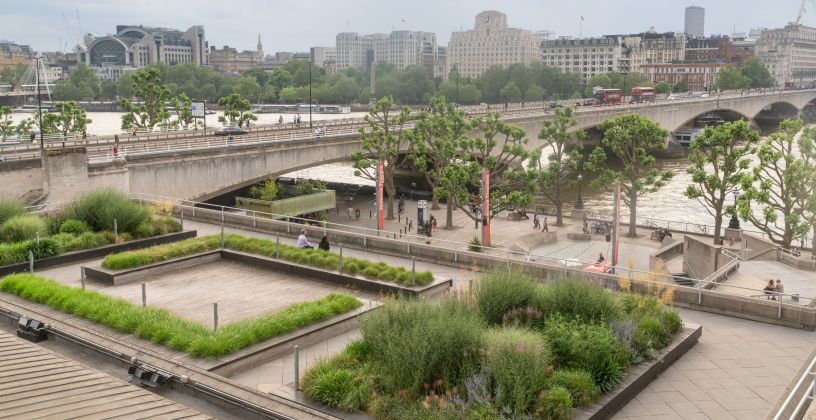
On Wednesday 24 May, South Bank BID, alongside Lambeth Council, South Bank and Waterloo Neighbours (SoWN) and WeAreWaterloo – our neighbouring BID – helped launch the Net Zero Action Plan and Strategy for Waterloo and South Bank.
Titled “Net Zero for Waterloo and South Bank: Building a greener and fairer Future Neighbourhood”, the strategy and action plan sets out the collective ambition for the neighbourhood to achieve net zero carbon dioxide emissions by 2030. This builds on the targets outlined by Lambeth Council and the Mayor of London, at a local and neighbourhood level. To drive this important work forward, businesses, resident groups and other local organisations have come together to work both individually and in collaboration across several projects and initiatives.
This partnership work was a key focus of the event held in St. John’s Church – located in the heart of the South Bank BID area – where representatives across cultural, commercial, community and residential groups spoke about the need to work in tandem across sectors to deliver the ambitions set out in the action plan and strategy. Panellists and questions also touched on how knowledge and learning could be shared across the area, considering the hub of educational bodies located here alongside world leading arts and culture organisations, and independents.
St John’s Church itself is an example of a local regeneration project driven by sustainability, having recently completed a £5.5m renovation including a retrofit and the installation of 80 solar panels on its Grade II listed roof, making it one of London’s most sustainable historic landmarks. The event also highlighted other important local projects that were already underway and included in the action plan, including Sustainable Ventures’s expansion in County Hall to become Europe’s largest workspace and cluster of climate tech businesses, and St Thomas’ Hospital’s river freight pilot to minimise deliveries.
Nic Durston, Chief Executive of South Bank BID and South Bank Employers’ Group, remarked that:
“The launch of this strategy and action plan marks a firm commitment by Waterloo and South Bank organisations to spearhead the area’s transition to net zero, creating a blueprint for district-wide collaboration and partnership. This builds on many years of successful partnership working across business, residents, community groups, and statutory bodies.”
The full technical report – the development of which South Bank businesses were invited to take part in and share their perspective on – communicates a vision for the whole area, supplemented by projects such as those mentioned above. These are in line with the GLA’s five sectoral themes and priorities set out in their Future Neighbourhoods programme:
Retrofitting of homes, commercial and public buildings
Creating a decarbonised, smart and integrated energy system
Improving air quality and creating zero emission zones
Climate adapted, resilient and green neighbourhoods
Zero waste, circular economy
The development of the strategy and action plan was commissioned by Lambeth Council, with the support of SOWN, South Bank BID and WeAreWaterloo, following funding by the Mayor of London’s Future Neighbourhoods 2030 programme. Both the action plan and extended strategy can be found here – many thanks to all the speakers, panellists and attendees who shared their perspective at the launch. The BID will continue to share with levy payers key and important developments relating to the delivery of the strategy and action plan.
